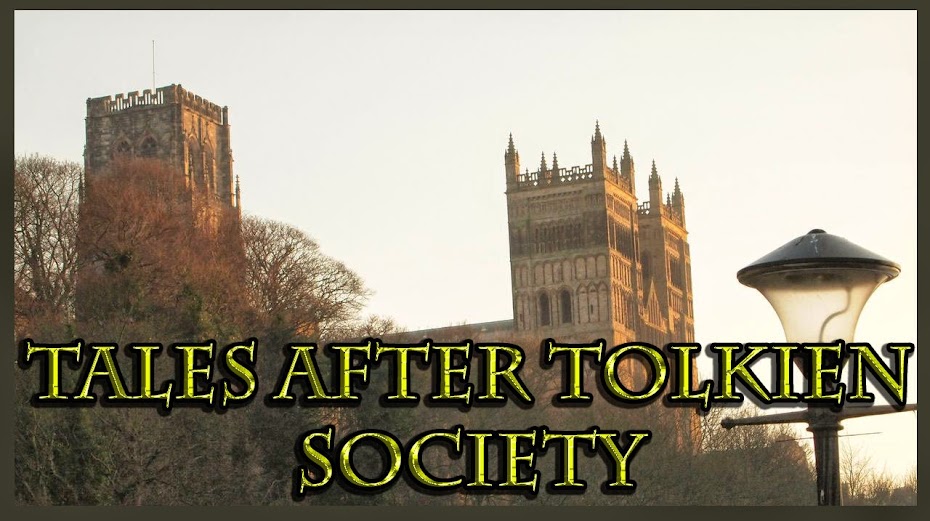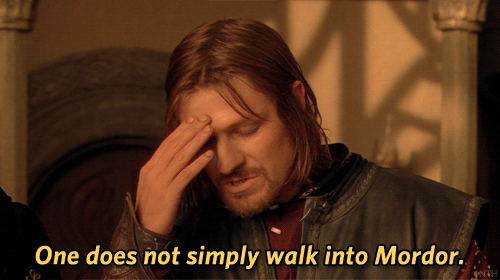Read the previous entry here.
Read the next entry here.
In the penultimate episode of the season, many characters are left in dark places.
2.8, "The Book of Destiny"
Written by Aaron Ehasz and Justin Richmond
Directed by Villads Spangsberg
Synopsis
 |
Nobody's singing...
Image taken from the episode, used for commentary.
|
Following the fight at the dragon, the three princes, Rayla, and Bait proceed through the rain towards Xadia, Callum suffering from his exertions. Claudia begins to tend to the injured Soren without success; he has been rendered quadripeligic, and Claudia makes to take him to a physician.
As the princes, Rayla, and Bait reach shelter, Rayla upbraids Callum for his use of dark magic. He slips into delirium, beginning a strange internal journey that forces him to confront his background and himself. Rayla tends him throughout, if somewhat grudgingly.
 |
How the problem with this is unclear...
Image taken from the episode, used for commentary.
|
In Katolis, the high council receives reports that Viren is in hiding and must be pursued. Viren continues investigating the mirror and the figure within it: Aaravos. Viren cuts contact with Aaravos and departs stealthily, trying to conduct research. Every mention of Aaravos he encounters clears itself in front of him before he can glean any information. He confronts Aaravos about this.
As Rayla and Ezran tend Callum, Corvus appears. Recognizing Ezran, Corvus identifies himself and lays down his arms, saluting the new king. Ezran realizes his father has died and rages at Rayla before he takes a walk to clear his head. At length, Corvus pursues Ezran, despairing of his life in the woods; Rayla, laughing, dispels his fears.
In a nearby town, Claudia frets as Soren is examined. The prognosis is poor; the physician expects no recovery. Claudia proposes to inform Soren; it does not go well for either of them, with Soren sullenly musing on his failure as a hero and his injuries, as well as his mission to kill the princes. Claudia, for her part, reacts adversely to his words and ransacks the physician's office looking for a remedy until she is ejected.
 |
"Hi, Claudia."
Image taken from the episode, used for commentary.
|
Walking the streets, Claudia encounters Ezran.
Discussion
Callum's experiences in the episode smack of the medieval dream vision, which Mary Wellesley notes "was as popular in the Middle Ages as the novel is in our own time"; prominent English-language examples include Dream of the Rood, Pearl, and Hoccleve's Regiment of Princes. In them, there is typically a frame in which the narrator falls asleep, with the dream itself--and its psychologically dense malleability--allowing for sustained involvement of otherwise impossible things and deeply symbolic figures that can then be explicated, either within the narrative didactically or by audiences. While the constraints of media change specifics of form, the general pattern appears to bear out in the present episode.
 |
Not just dark, but dark and teenaged.
Image taken from the episode, used for commentary.
|
For example, Callum is confronted with a dark version of himself that attempts to persuade him to take up dark magic more fully. He is also greeted by his deceased mother and stepfather, as well as dragged through a suddenly appearing ocean and confronted by Villads. He moves from scene to scene with no real transition, evidently at random and with little seeming sense, though with occasional bits of overt silliness--until the end of the episode, which stops before resolution.
 |
Exhibit A.
Image taken from the episode, used for commentary.
|
 |
Exhibit B.
Image taken from the episode, used for commentary.
|
Notably, too, the library at Katolis appears to be well stocked with texts in multiple languages. One evokes the Orientalism already identified as at work in the series, presenting script reminiscent of if not actually in Arabic. (I do not read the language and so cannot tell for sure; the fault is mine and not the episode's.) Another reads in Danish (and offers a lovely bit of insight into the character of Aaravos and his potential significance). Although common concepts of the medieval depict the period as being illiterate--and it is true that literacy among the people of medieval Europe was far more restricted than it has since become, or than it was in Roman Europe, due in part to limited access to paper--it is far from the case. Indeed, the dream visions of which Callum's experiences in the episode partake are themselves attested in medieval writing. Further, as
Jocelyn Wogan-Browne notes, medieval English was deeply multicultural, pulling from many languages and peoples; as Katolis and the human kingdoms evoke medieval England in many respects (the Pentarchy comes to mind as but one example), it is not to be wondered at that it, too, would exhibit a multilingual repository--the more so because of the presence of scriptoria across Europe, about which much has been written, and eloquently, by other scholars.
The episode and its series are fantasy, yes, but they are rooted in what has been and can be observed of the medieval from which they draw so much.



















